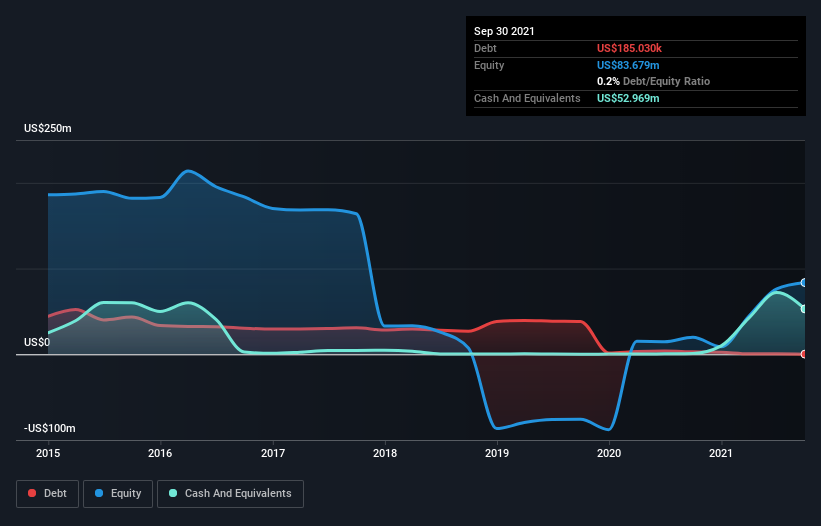- United States
- /
- Diversified Financial
- /
- NasdaqCM:FTFT
We're Not Very Worried About Future FinTech Group's (NASDAQ:FTFT) Cash Burn Rate

There's no doubt that money can be made by owning shares of unprofitable businesses. For example, biotech and mining exploration companies often lose money for years before finding success with a new treatment or mineral discovery. But the harsh reality is that very many loss making companies burn through all their cash and go bankrupt.
Given this risk, we thought we'd take a look at whether Future FinTech Group (NASDAQ:FTFT) shareholders should be worried about its cash burn. In this article, we define cash burn as its annual (negative) free cash flow, which is the amount of money a company spends each year to fund its growth. First, we'll determine its cash runway by comparing its cash burn with its cash reserves.
Check out our latest analysis for Future FinTech Group
When Might Future FinTech Group Run Out Of Money?
A company's cash runway is calculated by dividing its cash hoard by its cash burn. Future FinTech Group has such a small amount of debt that we'll set it aside, and focus on the US$53m in cash it held at September 2021. Looking at the last year, the company burnt through US$17m. Therefore, from September 2021 it had 3.0 years of cash runway. A runway of this length affords the company the time and space it needs to develop the business. You can see how its cash balance has changed over time in the image below.

How Is Future FinTech Group's Cash Burn Changing Over Time?
In our view, Future FinTech Group doesn't yet produce significant amounts of operating revenue, since it reported just US$13m in the last twelve months. As a result, we think it's a bit early to focus on the revenue growth, so we'll limit ourselves to looking at how the cash burn is changing over time. The skyrocketing cash burn up 192% year on year certainly tests our nerves. It's fair to say that sort of rate of increase cannot be maintained for very long, without putting pressure on the balance sheet. In reality, this article only makes a short study of the company's growth data. You can take a look at how Future FinTech Group is growing revenue over time by checking this visualization of past revenue growth.
Can Future FinTech Group Raise More Cash Easily?
While Future FinTech Group does have a solid cash runway, its cash burn trajectory may have some shareholders thinking ahead to when the company may need to raise more cash. Issuing new shares, or taking on debt, are the most common ways for a listed company to raise more money for its business. Many companies end up issuing new shares to fund future growth. By looking at a company's cash burn relative to its market capitalisation, we gain insight on how much shareholders would be diluted if the company needed to raise enough cash to cover another year's cash burn.
Since it has a market capitalisation of US$118m, Future FinTech Group's US$17m in cash burn equates to about 15% of its market value. Given that situation, it's fair to say the company wouldn't have much trouble raising more cash for growth, but shareholders would be somewhat diluted.
Is Future FinTech Group's Cash Burn A Worry?
On this analysis of Future FinTech Group's cash burn, we think its cash runway was reassuring, while its increasing cash burn has us a bit worried. Based on the factors mentioned in this article, we think its cash burn situation warrants some attention from shareholders, but we don't think they should be worried. On another note, Future FinTech Group has 3 warning signs (and 2 which are concerning) we think you should know about.
Of course Future FinTech Group may not be the best stock to buy. So you may wish to see this free collection of companies boasting high return on equity, or this list of stocks that insiders are buying.
New: AI Stock Screener & Alerts
Our new AI Stock Screener scans the market every day to uncover opportunities.
• Dividend Powerhouses (3%+ Yield)
• Undervalued Small Caps with Insider Buying
• High growth Tech and AI Companies
Or build your own from over 50 metrics.
This article by Simply Wall St is general in nature. We provide commentary based on historical data and analyst forecasts only using an unbiased methodology and our articles are not intended to be financial advice. It does not constitute a recommendation to buy or sell any stock, and does not take account of your objectives, or your financial situation. We aim to bring you long-term focused analysis driven by fundamental data. Note that our analysis may not factor in the latest price-sensitive company announcements or qualitative material. Simply Wall St has no position in any stocks mentioned.
Have feedback on this article? Concerned about the content? Get in touch with us directly. Alternatively, email editorial-team (at) simplywallst.com.
About NasdaqCM:FTFT
Future FinTech Group
Through its subsidiaries, engages in supply-chain financing services and trading businesses in the People’s Republic of China.
Flawless balance sheet moderate.
Similar Companies
Market Insights
Community Narratives



